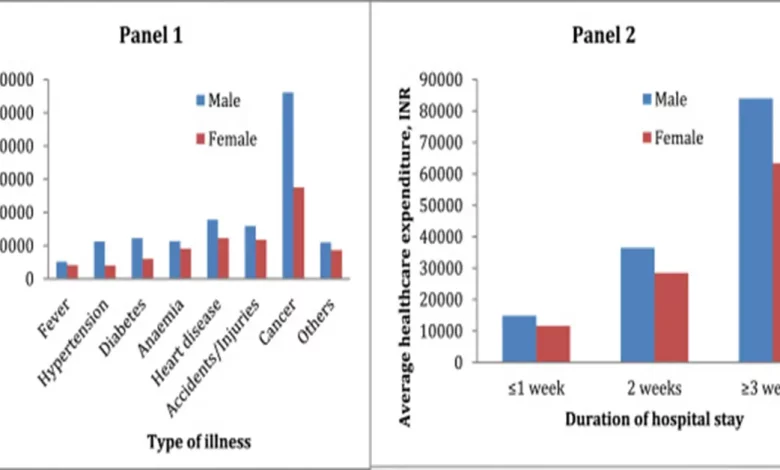Gender Disparities – Big Blindspot in India’s Health Policy
GS Paper 2 - Health and Education

Context – Despite comprising nearly half of India’s health workforce, women face significant barriers in reaching leadership positions within the healthcare sector, highlighting deep-rooted gender disparities in health policy and decision-making.
Understanding the Gender Gap
- Data revelations: Official data reveals that while women make up almost 50% of health workers in India, only 18% occupy leadership roles across various health panels, committees, hospitals, and ministries.
- Impact of Gender Disparity: The over-representation of men at the top of the health pyramid perpetuates inequalities in decision-making and policy making, leading to skewed health systems that fail to address the diverse needs of the population.
Findings of Research
- Diversity Gaps: Recent research highlights the prevalence of diversity gaps in India’s National Health Committees, with an “over-concentration” of men, doctors, individuals from urban areas, and bureaucrats. This centralization of power risks excluding diverse perspectives and experiences, hindering the development of inclusive health policies.
- Impact on Policy Formulation: The lack of gender diversity in health committees affects policy outcomes, as decisions are often made from a narrow lens, overlooking the nuanced needs of marginalized groups. For instance, the absence of women in decision-making bodies may lead to inadequate consideration of gender-specific health issues such as access to nutritious food for women.
Challenges faced by Women
- Women encounter various obstacles in advancing their careers in the health sector, including limited opportunities for promotion, unequal pay, and cultural expectations regarding gender roles.
- Women are significantly underrepresented in medical leadership positions, both within health committees and healthcare institutions, further perpetuating gender disparities in decision-making and policy formulation.
- One of the primary challenges confronting women in India is the lack of autonomy and agency in making decisions related to their health. Deeply entrenched patriarchal norms often dictate women’s access to healthcare, with their mobility and decision-making power being severely curtailed within familial and societal structures.
- This not only limits their ability to seek medical care when needed but also perpetuates a cycle of poor health outcomes and diminished well-being.
- Furthermore, the issue of gender disparities extends beyond access to healthcare facilities to the quality and appropriateness of services provided. Women frequently encounter discrimination and bias within healthcare settings, which adversely impact their treatment outcomes.
- From diagnostic biases to inadequate attention towards reproductive health needs, the healthcare system often fails to cater to the unique requirements and concerns of women, thereby exacerbating existing disparities.
- The ramifications of gender disparities in health are far-reaching and extend beyond individual well-being to broader societal and economic dimensions. Research indicates that addressing gender inequalities in health can yield substantial dividends in terms of overall health outcomes and socio-economic development.
Recommendations for Change
- Policy Interventions: Affirmative policies, such as reserving seats for women and marginalized groups in health committees, can help address gender disparities and promote inclusive decision-making.
- Structural Reforms: Structural changes within healthcare institutions, such as promoting flexible working arrangements and providing dedicated resources for women leaders, are essential to breaking down barriers to gender equality in leadership.
- Community Engagement: Involving directly affected communities in policy-making processes can ensure that health policies are responsive to the needs and priorities of the population, fostering greater inclusivity and accountability.
Way Forward
Achieving gender equality in health leadership requires concerted efforts to address systemic barriers and promote inclusive decision-making. By prioritizing diversity and inclusivity in health policy, India can build more responsive and equitable health systems that serve the needs of all its citizens.
As India charts its course towards achieving the Sustainable Development Goals and building a healthier and more equitable society, addressing gender disparities in health must occupy a central place in its policy agenda. The time to act is now, for every woman’s right to health is not just a matter of principle but a fundamental human right that must be upheld and protected.
SOURCE: The Hindu





.png)



